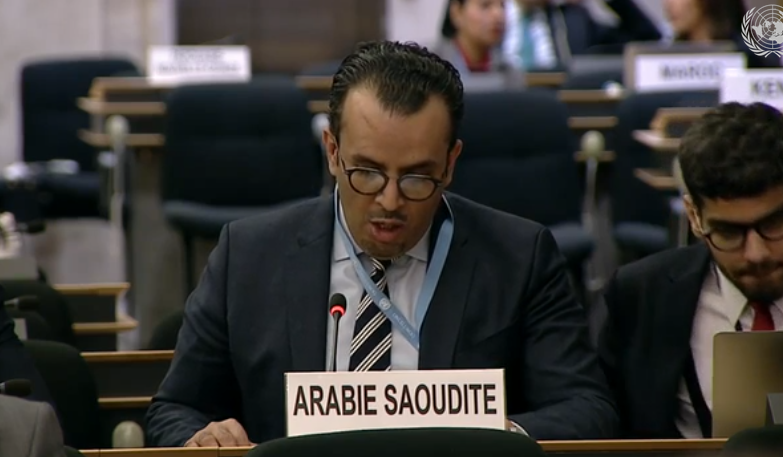
Through its tracking of the Kingdom of Saudi Arabia’s rhetoric on human rights in international forums and its monitoring of Saudi statements at the 43rd session of the HRC that concluded on 12 March 2020, ESOHR found that Saudi Arabia is pursuing the same approach it has been following: statements made by the official delegation cling to deceptive methods, factual criticisms are rejected, and vain attempts are made to give legitimize the violations of domestic and international laws.
In its response to the criticism from many countries of its rights record, within the discussions of Item 4 of the HRC agenda, Saudi Arabia, via its representative, Abdullah Masoud al-Qahtani, claims to be continuing its efforts to strengthen and protect human rights in cooperation with various UN human rights institutions.
Several countries have condemned Saudi Arabia’s rights abuses as part of the discussions of Item 4. Norway called for allowing freedom of opinion and expression, and Sweden criticized the misuse of counterterrorism laws in Saudi Arabia. The European Union and Iceland expressed concern over arbitrary detentions, while Denmark expressed its fears over the death penalty, and Finland called for the protection of human rights advocates and punishment for the killers of Khashoggi.
Saudi Arabia stated that the detainees referred to in the statements were not arrested for exercising their rights or for being activists, but rather for their acts in violation of the public order and the law. Likewise, it claimed that it has guaranteed them the full enjoyment of their rights and they are currently subject to legal procedures that ensure them a fair trial.
Saudi Arabia’s response contained an implicit acknowledgment that it arrests activists, when it said that a person being an activist does not mean that he or she has the right to violate the law and that no one is above the law.
Regarding the murder of journalist Jamal Khashoggi, Saudi Arabia said that it took all the measures necessary to ensure a fair and transparent trial for those involved in the crime, in a manner that guarantees all the parties their legal rights. Moreover, it said that the court hearings were attended by representatives of the embassies of the five permanent member nations of the Security Council, along with Turkey and Saudi rights organizations. Saudi Arabia rejected any approaches to Khashoggi’s case and called for handling human rights issues fairly and objectively and avoiding being drawn in by groundless sources.
ESOHR believes that Saudi Arabia’s response to the criticisms of other countries is but a vain attempt to deceive and avoid admitting the proven facts. Monitoring of the nature of the charges against detainees confirms that some of them are related to expressing opinions in the media, sharing information about the status of human rights in the country, and communicating with UN agencies. Individuals are also deprived of their legal guarantees to a fair trial, with many violations observed, including conducting investigations without the presence of a lawyer, failing to investigate allegations of torture, and conducting secret trials.
Regarding the Khashoggi case, Saudi Arabia’s step so far were clearly aimed at protecting some officials from investigation and punishment. The report of the Special Rapporteur for Extrajudicial Killing found that Saudi officials who were not investigated were also involved in the killing, including Crown Prince Mohammed bin Salman. The report also referenced the involvement of Saud al-Qahtani and Ahmed Asiri. Furthermore, letters from UN Special Rapporteurs made clear that the trial lacked the necessary conditions of fairness.
ESOHR believes that Saudi Arabia’s rhetoric on rights focuses on deception and avoiding facts and reinforces impunity. Meanwhile, the Saudi government continues to close the civil space to any independent activists or neutral parties. Saudi Arabia’s reliance on misleading rhetoric on one hand, and on tightening its repressive grip on civil society to prevent discussion of the violations on the other hand, indicates the lack of intention on the part of Saudi officials to stop human rights violations and crimes against humanity.
